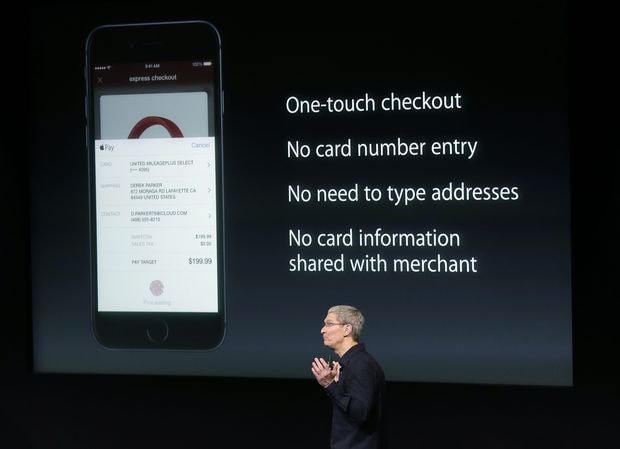Apple Pay makes banks both fascinated and afraid
(Baonghean.vn) - On Monday, October 20, the contactless mobile payment system Apple Pay officially went live in the US. Can this application revolutionize payment methods like iTunes did with music? What can be seen immediately is that Apple Pay has attracted the attention of the banking industry.
 |
| Tim Cook introduces Apple Pay, October 16 in Cupertino, California. |
On Thursday, October 16, Apple CEO Tim Cook said that he had reached agreements with about 500 US banks, including the largest banks today, and about 22,000 points of sale, including fast food chain McDonald's. Building the Apple Pay payment system is an inevitable development for the bitten apple, because they have in hand the banking information of about 800 million customers thanks to iTunes and the virtual store AppStore. This application is developed on the NCF (near field communication) platform, a technology that allows contactless payments, by bringing the payment-enabling object within a few centimeters of the payment device. This feature is integrated into most payment cards and smartphones on the market today.
Security is the biggest question for this payment method, because no personal identification password is required when users pay with NFC. In addition, NFC is said to be easily detected within a range of a few meters. Apple claims to have overcome the disadvantages of NFC by not forwarding the user's bank account information to the seller. At the same time, Apple's latest devices are also equipped with the Touch ID digital identification system.
Apple will receive a 0.15% transaction fee from banks. Financial intermediaries in the US are already signing up to use the service in the hope of increasing transaction fees. Above all, Apple promises that Apple Pay will reduce the risk of fraud, which is very high in the country where magnetic stripe cards are the most widely used.
That’s also why Apple Pay is unlikely to expand across the Atlantic, since chip cards have long solved the problem of fraud. “It would be very difficult for Apple to conquer the European market. The market here is very fragmented and commission fees are tight,” said Pascal Burg of consultancy Edgar Dunn. Recognizing this difficulty, Apple has just hired two senior employees from Visa Europe in recent weeks to prepare for its landing on the Old Continent.
“I was in a meeting with European banks last week and three-quarters of the conversation was about Apple Pay. Some of them saw it as an opportunity because merchants would be forced to update their payment devices. Some were worried about losing their intermediary position,” said Mr. Burg.
In France, the commission is paid by the seller, then divided between the seller's bank, the buyer's bank and the payment network (Visa, MasterCard, etc.). The fear of all these actors is that Apple will overtake them and push them out of the game. It's not just about commissions, what businesses are most concerned about is "who ultimately collects and holds the information and customer relationships," explains an industry expert. The purpose is to "coordinate promotions, coupons for loyal customers; study purchase history and suggest new items to consumers."
"Apple Pay's many unique features will make it the new standard for everyday payments," concludes Denee Carrington, an analyst at Forrester. But to become a popular app and for Apple Pay to define a new payment method, it needs to build and supplement the shortcomings of the app. Specifically, it needs to create long-term value for consumers and merchants: what will they really benefit from using Apple Pay? In addition, it is necessary to pay attention to the feature of analyzing customer behavior through collected data - something that Apple has, is and will certainly do, no matter how much they insist on denying it.
Thuc Anh(The world)






